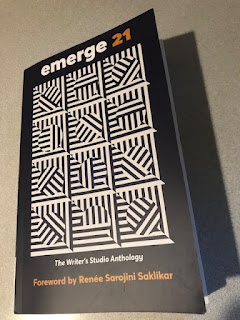For travellers who find reading and writing an essential service, I’m sure there is at least one anthology in your past whose gates you opened and explored its pages, finding yourself at home in some of its writings, losing yourself in others. Sometimes indifferent to voices that sounded like yours, other times attracted to those that did not. Sometimes, too, a neighbourhood of writings -- if not the entire town -- whose collective resonance rang greater than the sum of its parts. To the point where you might have wondered who it was that brought together and arranged these writings, and thus returned to its gates, to see who was responsible.
Poet-editor Gary Geddes's Skookum Wawa: Writings of the Canadian Northwest is a textbook that came out the year I entered high school, and by all accounts hung around for years after. (The words "skookum" and "wawa" belong to a Northwest pidgin trade language known as Chinook Jargon, and translate into English as "good" and "talk", respectively.) Rather than divide itself by genre, Geddes intermingles lineated poetry with paragraphic prose, non-fictive exposition and photography.
I thought little of Geddes's anthology when it was assigned to us in Grade Eight -- more an imposition than anything else -- but when I looked through it many years later (while waiting to do a library reading in Smithers), I appreciated the arrangement of its writings, despite the fact that all of it is by white settlers. Would renaming the anthology change that? No. Nor would adding to it Indigenous and diasporic writing. In this case, best to start again -- beginning with an Indigenous editor and the writings of Indigenous authors. As for the inclusion of writing by white settlers, I can't think of an Indigenous editor who has done such thing. Is it too early to do so? Never too late?
The opening (italicized) paragraph of this post is the opening I wrote for my review of SFU's Writer's Studio emerge 21 anthology, as commissioned by the Ormsby Review. (I abandoned my previous Ormsby review of Gregory Betts's Finding Nothing: the Vangardes, 1959-1975 once I realized I was writing -- and could only write -- a book-length response.) Although largely impressed with the quality of writing in emerge 21, I was critical of the editors' decision to organize it by genre, and it is in my review that I mention the example of Skookum Wawa, how it blended genres, as opposed to keeping them penned in, imprisoned, in chapters.


No comments:
Post a Comment